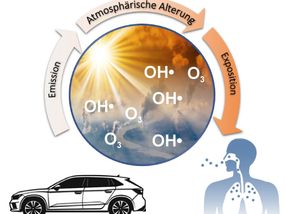2011 Record year for the German chemical industry - Weaker growth 2012
Engel: “Trends keep moving upward in 2012 for the German chemical industry"
No crisis mood for chemistry: the VCI expects further chemical industry growth
in 2012 – at much lower speed.
Record sales, production above pre-crisis level, higher research spending and more jobs: 2011 was a good year in many respects for the chemical industry in Germany. However, much slower growth is expected for 2012. This is the gist of the annual press conference of the German chemical industry association (VCI) in Frankfurt.
The VCI expects chemical production in Germany to increase by 1.0 percent in 2012. Producer prices, too, should rise by ca. 1.0 percent. Sales are likely to improve by 2.0 percent. VCI President Dr Klaus Engel explains: “It is hard to make exact predictions for the next 12 months. Figuratively speaking, the fog is getting denser; it is more difficult to look ahead.” The unsolved debt crises in the EU and the USA are increasingly causing uncertainty among consumers and companies, with dampening effects on chemical business 2012. Engel emphasizes: “There is no crisis mood in our industry. Trends will continue to move upward in the chemical industry, but at a slower pace than in 2011.”
The VCI bases this projection on various factors: Currently, experts estimate the gross domestic product to grow by roughly 1 percent in Germany and in the EU in 2012 – which will benefit industry too. Engel: “If our most important customer group who contributes around 22 percent to value creation in this country continues to grow, there is no reason why chemistry should not improve in the same range.” Some 80 percent of the output of chemical products goes to industrial customers.
According to the VCI, developments in stockpiling of chemicals at industrial customers do not point to recession for the chemical industry in 2012, either. The VCI President expects no slowdown effect for chemical business, neither from the stock cycle nor from oil price developments. Another stabilizing factor is the continuously growing share of German chemical exports to the global growth regions of Asia, Latin America and Eastern Europe.
Political uncertainty factors for economic developments 2012
However, Engel warns against political risks to economic developments for the entire euro zone. He sees refinancing of public debt in the EU as a considerable factor of uncertainty for economic developments: “The debt crisis is more and more becoming a burden on the real economy, because so far politicians have not succeeded to convince financial markets of the effectiveness of their measures.” But Engel points to the forthcoming summit in Brussels, where a further package to stabilize the debt crisis and the euro is to be adopted: “We hope that this will make financial markets regain their trust in political actions. This would benefit the real economy too.”
Engel views decisions regarding the energy turnaround (Energiewende) as another uncertainty factor for developments in Germany’s third-largest industry: “The rise in electricity prices, further driven up by the renewable energy sources act (EEG) and emission trading, causes much uncertainty in chemical companies.” In 2011 state-imposed burdens – through the EEG and other relevant energy legislations – add up to over 1.3 billion euros for the chemical industry. Engel about possible bottlenecks in energy supply: “The proverbial litmus test is still ahead of us after eight nuclear power plants are shut down and we will have to find out whether base load supply for our companies continues to function fully and reliably throughout the winter months.“
The chemical year 2011 in facts and figures
Production: Output growth of chemical products was much higher than the VCI had expected 12 months ago: in 2011 chemical production improved by 4.0 percent against the previous year.
Sales: In 2011 total sales of the German chemical industry rose by 9 percent to 186.5 billion euros. Business with customers abroad developed somewhat more dynamically than domestic business. Foreign sales of German chemical companies went up by 10 percent to 110.2 billion euros. In parallel, domestic sales climbed by 7.5 percent to 76.3 billion euros.
Prices: In the outgoing year, prices of chemicals and pharmaceuticals increased by 5 percent on average. Higher raw material costs forced many companies to raise the prices of their products. But there was a slight drop in raw material costs in the course of 2011. With the slower demand, the upward trend of prices ended in the 4th quarter.
Investment: With the fast recovery of German chemical business, companies had given up their reserved investment attitude already last year. This trend persisted in 2011. Back in 2010 the chemical industry invested some 5.8 billion euros in buildings and plants; for 2011 the VCI estimates investments to total roughly 6.4 billion euros. This corresponds to an increase by 10 percent.
Research spending: In 2011 the chemical industry emphasized its commitment to Germany as research location. This year German chemical companies increased their spending on the development of new products and processes by some 6.5 percent to 8.8 billion euros.
Employment: The good position of the chemical industry in 2011 positively impacted the labour market too. After vacancies had not been filled during the economic crisis, companies returned to hiring new staff. As a result, the number of jobs in the German chemical industry rose by 2.5 percent in 2011. Currently, the German chemical industry employs in total some 425,000 staff.
Foreign trade: In 2011 as a whole, exports – this term comprises foreign sales by German chemical companies, re-exports and additionally chemical exports by other industries – rose by 6 percent to 150.9 billion euros. Strongest growth rates were achieved in business with Asia and South America. But also customers in European neighbouring countries increased their orders with German chemical companies. Imports of chemical products went up by 7.5 percent to 109.2 billion euros. With over 41 billion euros, German chemical companies once more significantly contributed to Germany’s export surplus in 2011.




























































